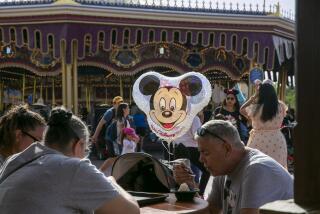Hare Mail
- Share via
Bugs Bunny is at it again, confounding the serious and carelessly triumphing over his enemies. This time, he is up against flesh-and-blood stamp collectors upset that Bugs has become the first animated character to be pictured on a U.S. postage stamp.
“The higher purpose of the stamp program is being prostituted,” said Kathleen Wunderly, education director for the American Philatelic Society, adding: “I like the rabbit as a rabbit, but it doesn’t have a place on a U.S. stamp.”
Wunderly is among a segment of collectors who lament the new trendiness of stamps, the dumbing down of a venerable tradition--or, more specifically, the ceding of a spot once reserved for the likes of Benjamin Franklin to a strangely upright rabbit munching a carrot.
“Most of my people are very upset about this,” said Michael Laurence, editor and publisher of Linn’s Stamp News in Sidney, Ohio.
But like Elmer Fudd, disgruntled collectors aren’t likely to get satisfaction: the Bugs Bunny commemorative postage stamp is expected to be a big hit with the public.
It will be officially issued at a ceremony on the Warner Bros. lot in Burbank today. The stamps, all 265 million of them, are now on trucks bound for post offices from the agency’s Clinton, S.C., printer.
The Postal Service, which approved the stamp after intense market research, calls Bugs Bunny an icon.
“He’s part of America’s history and he’s fun too,” said Barry Zeihl, Postal Service spokesman. The idea for the stamp came from--who else?--Warner Bros., the studio whose animators sketched the first Bugs Bunny in 1940.
But out of concern that the agency’s Ben Franklin stamp collecting program for children was growing less popular, postal officials were already contemplating such a stamp, Zeihl said.
Postal officials earlier discussed issuing stamps bearing Disney characters with the Walt Disney Co. But Disney wanted royalties, which the Postal Service was not willing to pay, Zeihl said. A Disney spokesman said he could “neither confirm nor deny” that discussions had taken place.
Then came Bugs Bunny. Warner Bros. asked for no royalties on stamps, only license fees on related merchandise such as mugs, posters and T-shirts.
Focus groups conducted by the Postal Service indicated that the rabbit would go over big with children, and would make a fitting mascot for its new, more popular stamp collecting program, Zeihl said.
After some debate, Bugs Bunny was approved by the citizens advisory committee that oversees new stamp designs.
So far, public response has been favorable, Zeihl said: Bugs Bunny, “is one of the funnest stamps we’ve seen in years,” he said.
Many stamp enthusiasts agree: “It’s a colorful, attractive, modern design that people will enjoy seeing on the mail,” said Robert E. Lamb, head of the 56,000-member American Philatelic Society.
But Lamb said his members are divided. “Collectors are very traditional people,” he said. “They see this as the undermining of the culture, if you will.”
The debate is a sign of the depth of change in the U.S. Postal Service, an agency that is mandated by Congress to be self-supporting.
Threatened by the growth of private delivery services, the Postal Service has gone aggressively commercial in recent years, and extensive, corporate-style marketing has made the last two years the most profitable in Postal Service history.
Commemorative stamps, though a tiny part of revenues, have become tinged with the new commercial spirit. Among the splashy, big-grossing issues of recent years have been Elvis Presley, Marilyn Monroe, and James Dean. A set of stamps honoring old comic books has also been issued.
But even by those standards, Bugs Bunny stands out.
For one thing, he’s not real. But his stamp is being touted just like that of any public figure. In public statements, postal officials invariably refer to the rabbit as “he” rather than “it.”
Real or not, fans say the rabbit has earned his place on a stamp.
“He transcends generations,” said Zeihl, noting that the rabbit entertained troops in World War II, sold war bonds, and even touted the Postal Service.
Bugs Bunny appeals to Americans because of his “irreverent attitude, his hipness. He is alive in people’s minds,” said Sandy Reisenbach, executive vice president of marketing for Warner Bros.
Reisenbach said returns on license fees from the stamp project are not significant, although he acknowledged that the stamp “is a wonderful promotion.”
But Laurence of Linn’s Stamp News called the deal “a blatantly commercial relationship between the Postal Service and [the studio].”
Zeihl says the agency’s relationship with Warner Bros. is well within Postal Service guidelines. Besides, he said, “the nature of America today is commercial.”
Bugs Bunny deserves recognition because he represents an American ethos, contends Peter Marston, professor of speech/communications at Cal State Northridge.
“He represents the ability to overcome problems by outsmarting the enemy, by being ingenuous and creative,” he said.
At the heart of the rabbit’s persona is the spirit of the very commercial culture the stamp’s critics deplore: “Bugs Bunny manages situations by impersonation. That is very much an American mode. It’s just the way our whole advertising culture works,” Marston said.
M. Thomas Inge, professor of humanities and Randolph-Macon College, Ashland, Va., dismisses the concerns about commercialism. “We live in an age when our folklore is copyrighted,” he said.
Inge places Bugs in a long folkloric tradition of “trickster” heroes, not to mention a class of satirical, modern existentialists--right up there with Thomas Pynchon.
Bugs Bunny “thumbs his nose at all aspects of life,” Inge said. “He laughs at death, laughs at the larger universe.”
More to Read
The biggest entertainment stories
Get our big stories about Hollywood, film, television, music, arts, culture and more right in your inbox as soon as they publish.
You may occasionally receive promotional content from the Los Angeles Times.










